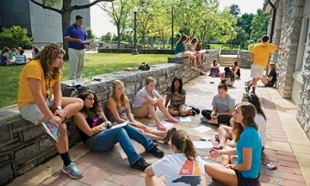It's complicated
JMU in the Community
The keys to ethical reasoning
By Martha Bell Graham

An ambitious program. A high-minded challenge. A noble goal. A university with a history of tacking differently. And a world in desperate need of individuals who think ethically. Put these together and you have the scope of JMU's breathtaking new endeavor, Madison Collaborative: Ethical Reasoning in Action.
In his bestselling book Blink, author Malcolm Gladwell wrote: "The key to good decision making is not information. It is understanding. We are swimming in the former. We are desperately lacking in the latter."
James Madison University wants to change that through an ambitious new program to teach critical thinking. The Madison Collaborative: Ethical Reasoning in Action is the university's new Quality Enhancement Program that will take the knowledge students acquire during their Madison Experience and deepen it with ethical reasoning. The university-wide plan seeks to instill in every student a competency for addressing life's challenges and for making decisions and choices based on thoughtful, ethical reasoning.
The heart of the Madison Collaborative is Eight Key Questions that form a framework on which students will learn to probe and understand myriad situations they encounter. These questions and the practice of applying them will be deeply embedded throughout the university's fabric.
The Pressing Need
Uncivil discourse is rampant in the modern public square. Scandals in corporations, academia, government and nonprofits dominate headlines. Add to this, complex questions arising from modern life: How does one allocate limited resources for health care or food? How does one equitably select candidates for lifesaving transplant lists? What is a corporation's responsibility to its workers in developing nations? How does one balance human need with human want?
Few would argue with the pressing need for ethical reasoning.
A 2013 study published by the Association of American Colleges and Universities clearly defines the challenge for educators. Based on a survey of top level executives, 93 percent agreed that a job candidate's "demonstrated capacity to think critically, communicate clearly, and solve complex problems is more important than [a candidate's] undergraduate major."
Ethical Reasoning in Action addresses that need. And the task, JMU President Jon Alger says, "goes right to the very heart of our educational mission. How do you translate ethical reasoning into decision making and effecting peoples' lives?"
The Madison Collaborative has three main objectives, says Lee Sternberger, associate provost for academic affairs, who led the large, university-broad committee to develop the program. These objectives are to elevate public discourse, to create a campus-wide framework for teaching and assessing ethical reasoning development in students, and to use it in the real world.
"We want students to take these three critical thinking skills and apply them not just to the classroom but also in their personal, professional and civic lives," Sternberger says.
The Madison Collaborative is as necessary as it is ambitious.
|
"We know ... that our most important function is to produce good leaders for the next generation" Meg Mulrooney, associate professor of history and associate dean of University Studies |
Ethical reasoning "has to be cultivated in a rigorous academic, intellectual environment....One of the things we [JMU] have done since the beginning is to promote civic engagement. Ethical reasoning skills are absolutely essential to citizenship," she adds.
Clearly, however, the goal of the collaborative is not about teaching morals or making moral judgments. It is rather about actively assimilating the Eight Key Questions, which, says Alger, "reflect thousands of years of philosophical development from a variety of different perspectives, different types of disciplines throughout human history. All of them together create a rich tapestry of how to think about ethics."

Promise to prepare students
In August, Alger announced that William Hawk, JMU professor of philosophy, and Lori Pyle ('94, '96M), a graduate of JMU's doctoral program in strategic leadership, will serve as chair and associate chair, respectively, of the Madison Collaborative and direct its full implementation.
With the arrival of the Class of 2017, the program began in earnest during 1787, the weeklong orientation for first-year students. More than 160 trained facilitators from all over campus led students through a fictional but realistic disaster scenario, directing probing questions that required students to apply the Eight Key Questions. (See card at right).
One of the collaborative's aims is to ensure all students benefit by targeting general education courses, major-specific courses, and by including co-curricular involvement. Ethical Reasoning in Action will permeate the Madison Experience—in residence halls, clubs and organizations, student government, faculty and staff relationships, and athletics.
"We've done some of these things before," says Josh Bacon, director of judicial affairs at JMU and a collaborative task force member, "… But never have we intentionally made sure that all 4,000 plus freshmen understand this frame of looking at ethical decision making and choices."
Also built into the program is regular assessment of the program's efficacy by JMU's highly respected Center for Research and Assessment Studies. Using data they will collect, the collaborative will continually refine the courses and associated programs.
The hope is that the Madison Collaborative will be the cynosure for the university's goal to become a national model for the engaged university. As the planners wrote in their report, the collaborative "embodies and complements the university mission as we promise to prepare students to be 'educated and enlightened citizens who lead productive and meaningful lives.'"
Bob Kolodinsky, director of the Gilliam Center for Free Enterprise and Ethical Leadership and who piloted a course last year in preparation for this fall's launch, says, "JMU needs this. Every university needs this, but it is, perhaps, a way for JMU to stand out."
JMU's more
Teaching students to apply ethical reasoning as "second nature" would be the best outcome of the Madison Collaborative. To send 4,000 plus graduates so trained into the world every year is the dream. Their ability to replace "reflex with reflection," as collaborative chair Hawk says, will serve them well. And it will have a ripple effect as students equipped with practiced understanding of ethical reasoning become citizens of the world.
"JMU already values and promotes integrity within its community, as is reflected in our Mission Statement, Defining Characteristics, and motto 'Be the Change,'" the task force wrote. "Yet the complex society which our graduates enter calls us to do more."
The Madison Collaborative: Ethical Reasoning in Action is JMU's more.
